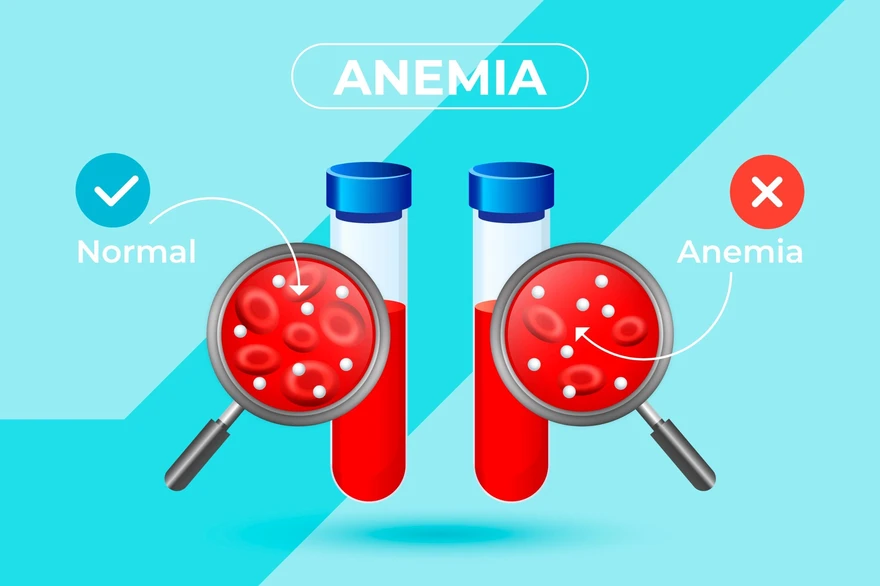Preventive Healthcare
Pernicious Anaemia Explained: Symptoms, Causes, and Treatment
902 Views
0

Introduction
It's common for people to feel fatigued occasionally. However, if the fatigue persists alongside other symptoms like weakness or confusion, it could be a sign of an underlying condition like pernicious anaemia. So what is this health condition? How does it affect us? And what steps can we take towards its prevention?
Pernicious anaemia is a type of vitamin B12 deficiency that affects the body's ability to produce healthy red blood cells. This deficiency occurs when the body cannot absorb vitamin B12 due to a lack of intrinsic factor, a protein produced by the stomach essential for absorbing dietary vitamin B12. In this article, we will delve into its causes, symptoms, diagnosis methods, treatment options, and preventive measures.
What is Pernicious Anaemia?
The word "anaemia" refers to a state where the body lacks enough healthy red blood cells or haemoglobin. Haemoglobin is the part of red blood cells responsible for carrying oxygen to the body's tissues. Therefore, various forms of anaemia can lead to oxygen deprivation in certain parts of the body resulting in fatigue and weakness.
Pernicious anaemia is a specific form of B12 deficiency anaemia primarily caused by an autoimmune response. This response leads to diminished production of a substance known as an intrinsic factor in the stomach. This substance is crucial as it helps absorb dietary vitamin B12 in the small intestine - a nutrient vital for proper red blood cell function.
How Does Pernicious Anaemia Affect?
The human body needs adequate vitamin B12 to produce healthy red blood cells. A deficiency of B12, as seen in pernicious anaemia, leads to a decrease in red blood cell production, resulting in less oxygen being transported to the body's tissues. This can cause a range of symptoms such as fatigue, weakness, and shortness of breath. Prolonged B12 deficiency can also lead to neurological complications like memory loss and depression.
Who is Affected by Pernicious Anaemia?
While pernicious anaemia affects people from different age groups and ethnicities, certain individuals are at a higher risk. These include people with a family history of the disease, those of Northern European or Scandinavian descent, and individuals over 60.
What are Pernicious Anaemia Symptoms?
The symptoms of pernicious anaemia progress slowly, making them hard to recognize initially. You may have become used to not feeling well, and therefore overlook these tell-tale signs:
- Fatigue
- Weakness
- Headaches
- Chest pain
- Weight loss
- Pale skin
In severe cases or if left untreated for long periods, more serious pernicious anemia symptoms can emerge due to neurological damage:
- Unsteady gait
- Peripheral neuropathy (numbness in arms and legs)
- Muscle weakness
- Depression
- Memory loss
- Dementia
What are Examples of Pernicious Anaemia Symptoms Caused by Long-Term Low Vitamin B12 Levels?
If vitamin B12 levels remain low for an extended period due to pernicious anaemia, it can lead to:
- Numbness in the arms and legs
- Confusion
- Depression
- Memory loss
- Dementia
These neurological symptoms arise from damage to the nervous system caused by prolonged vitamin B12 deficiency.
Can I have Pernicious Anaemia Without Having Symptoms?
Yes, it is possible to have pernicious anaemia without experiencing noticeable symptoms. This is why it is essential to undergo regular health check-ups, especially if you are at a higher risk or over 60 years old.
What Causes Pernicious Anaemia?
The inability to absorb vitamin B12 due to a lack of intrinsic factors characterises pernicious anaemia. There are two significant causes of pernicious anaemia: autoimmune and genetic. In most cases, the body's immune system attacks and destroys the cells (parietal cells) in the stomach that produce intrinsic factors. In other cases, it may be due to a genetic defect that prevents the production of intrinsic factors.
Certain risk factors make some individuals more prone to developing pernicious anaemia:
- Family history of the disease
- Being of Northern European or Scandinavian descent
- Having type 1 diabetes mellitus
- Having had part of your stomach removed
- Being 60 years or older
How is Pernicious Anaemia Diagnosed?
If you suspect you have pernicious anaemia, your doctor may suggest multiple tests such as:
- Complete Blood Count (CBC)
- Vitamin B12 level test
- Intrinsic factor and parietal cell antibodies test
These tests help evaluate red blood cell count, assess vitamin B12 levels, and check for antibodies against intrinsic factors and parietal cells necessary for absorbing B12.
How is Pernicious Anaemia Treated?
The pernicious anaemia treatment involves a two-step process:
- First, your doctor will treat any existing vitamin B12 deficiency through injections or high-dose oral supplements.
- Once your vitamin B12 levels return to normal, you may only need monthly injections, or your doctor may recommend switching to oral supplements.
Remember, it's crucial to start treatment as soon as possible to prevent irreversible nerve damage.
How Soon After Treatment Will I Feel Better?
The recovery period after starting treatment varies from person to person. Some may start feeling better within a few days, while others may take a few weeks. It's crucial to consult with your healthcare provider for a personalised recovery plan.
How Can I Reduce My Risk of Developing Pernicious Anemia?
Maintaining a balanced diet rich in vitamin B12 can help reduce the risk. Foods like meat, poultry, shellfish, eggs, and fortified nondairy milk are excellent sources of vitamin B12.
What Can I Expect if I Have Pernicious Anaemia?
Pernicious anaemia generally requires long-term treatment and monitoring. By starting early with treatment and regular check-ups, you can prevent complications and maintain good health.
How Do I Take Care of Myself?
Regular monitoring of your health, maintaining a balanced diet, and adhering to prescribed medication are vital. Always consult your healthcare provider before making any changes to your medication or diet.
How Often Should I See my Doctor?
You should see your doctor regularly based on their recommendation. This could range from every few months to once a year.
Conclusion
While pernicious anaemia can pose significant health challenges, understanding its symptoms, causes, and treatments can empower you on your journey towards better health. Regular medical check-ups are essential in managing this condition effectively and preventing potential complications.
At Metropolis Healthcare, we offer at-home sample collection services and advanced diagnostic labs to make the process of monitoring your health effortless. Our accurate pathology testing and health check-up services are designed with a patient-centric approach, making healthcare accessible and personalised. Don't overlook your health; take control today by scheduling an at-home sample collection appointment with us.
Remember, when it comes to your health, every step matters. And we'll be there with you on every step of that journey.























 WhatsApp
WhatsApp